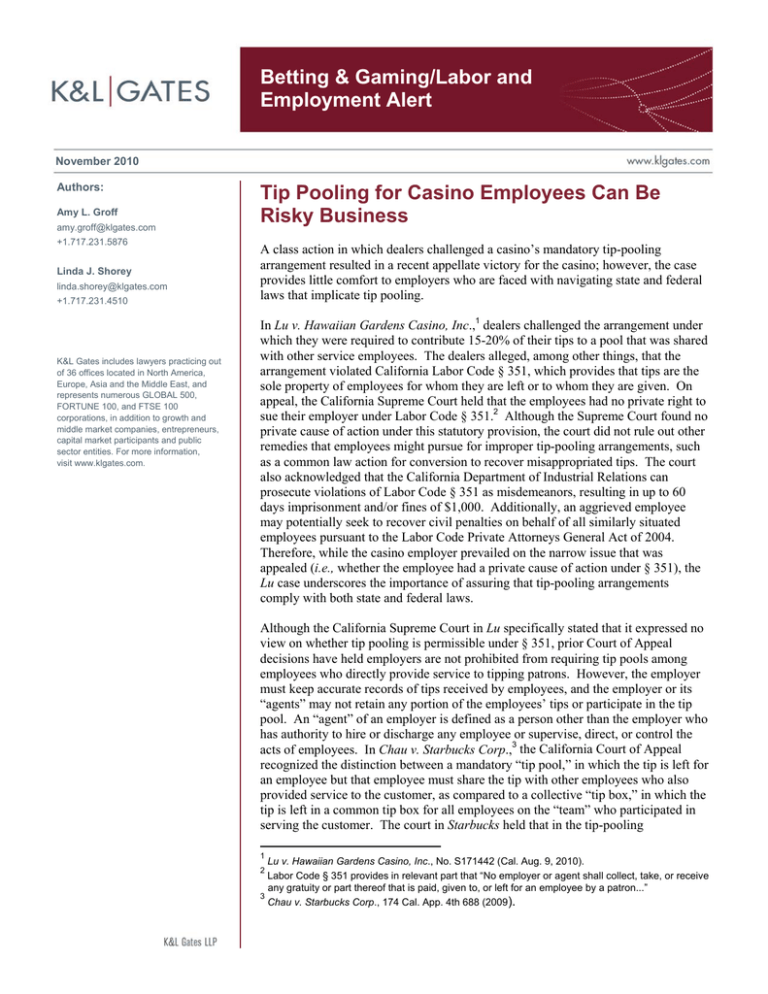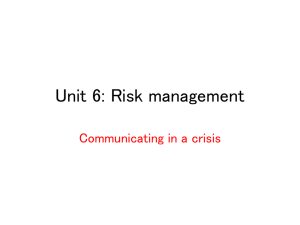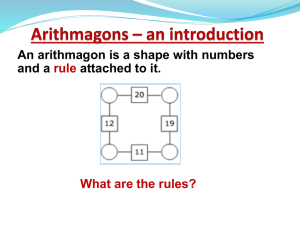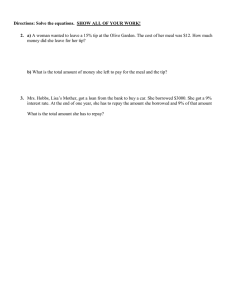
Betting & Gaming/Labor and
Employment Alert
November 2010
Authors:
Amy L. Groff
amy.groff@klgates.com
+1.717.231.5876
Linda J. Shorey
linda.shorey@klgates.com
+1.717.231.4510
K&L Gates includes lawyers practicing out
of 36 offices located in North America,
Europe, Asia and the Middle East, and
represents numerous GLOBAL 500,
FORTUNE 100, and FTSE 100
corporations, in addition to growth and
middle market companies, entrepreneurs,
capital market participants and public
sector entities. For more information,
visit www.klgates.com.
Tip Pooling for Casino Employees Can Be
Risky Business
A class action in which dealers challenged a casino’s mandatory tip-pooling
arrangement resulted in a recent appellate victory for the casino; however, the case
provides little comfort to employers who are faced with navigating state and federal
laws that implicate tip pooling.
In Lu v. Hawaiian Gardens Casino, Inc.,1 dealers challenged the arrangement under
which they were required to contribute 15-20% of their tips to a pool that was shared
with other service employees. The dealers alleged, among other things, that the
arrangement violated California Labor Code § 351, which provides that tips are the
sole property of employees for whom they are left or to whom they are given. On
appeal, the California Supreme Court held that the employees had no private right to
sue their employer under Labor Code § 351.2 Although the Supreme Court found no
private cause of action under this statutory provision, the court did not rule out other
remedies that employees might pursue for improper tip-pooling arrangements, such
as a common law action for conversion to recover misappropriated tips. The court
also acknowledged that the California Department of Industrial Relations can
prosecute violations of Labor Code § 351 as misdemeanors, resulting in up to 60
days imprisonment and/or fines of $1,000. Additionally, an aggrieved employee
may potentially seek to recover civil penalties on behalf of all similarly situated
employees pursuant to the Labor Code Private Attorneys General Act of 2004.
Therefore, while the casino employer prevailed on the narrow issue that was
appealed (i.e., whether the employee had a private cause of action under § 351), the
Lu case underscores the importance of assuring that tip-pooling arrangements
comply with both state and federal laws.
Although the California Supreme Court in Lu specifically stated that it expressed no
view on whether tip pooling is permissible under § 351, prior Court of Appeal
decisions have held employers are not prohibited from requiring tip pools among
employees who directly provide service to tipping patrons. However, the employer
must keep accurate records of tips received by employees, and the employer or its
“agents” may not retain any portion of the employees’ tips or participate in the tip
pool. An “agent” of an employer is defined as a person other than the employer who
has authority to hire or discharge any employee or supervise, direct, or control the
acts of employees. In Chau v. Starbucks Corp.,3 the California Court of Appeal
recognized the distinction between a mandatory “tip pool,” in which the tip is left for
an employee but that employee must share the tip with other employees who also
provided service to the customer, as compared to a collective “tip box,” in which the
tip is left in a common tip box for all employees on the “team” who participated in
serving the customer. The court in Starbucks held that in the tip-pooling
1
Lu v. Hawaiian Gardens Casino, Inc., No. S171442 (Cal. Aug. 9, 2010).
Labor Code § 351 provides in relevant part that “No employer or agent shall collect, take, or receive
any gratuity or part thereof that is paid, given to, or left for an employee by a patron...”
3
Chau v. Starbucks Corp., 174 Cal. App. 4th 688 (2009).
2
Betting & Gaming/Labor and Employment Alert
arrangement, the tip may not be shared with an agent
of the employer, but in the collective tip-box
arrangement, the tip may be shared with an “agent”
such as a shift supervisor, provided that such agent
actually participated in providing service to the
customer.
In the Lu class action, the lower appellate court
recognized that mandatory tip pooling is permitted
in the casino industry, but reversed the trial court’s
summary judgment in favor of the casino because it
found a question of disputed fact as to whether
certain employees in the tip pool had supervisory
responsibilities that made them “agents” who were
not permitted to participate in the tip pool.
Recipients of tips from the tip pool in that case
included chip runners, poker tournament
coordinators, poker rotation coordinators, floormen,
customer service representatives (formerly called
“relief supervisors”), hosts, and concierges. Because
the Supreme Court in Lu reviewed only the narrow
issue of whether Labor Code § 351 provides a
private right to sue, it did not analyze the propriety
of the tip pool challenged in that case.
Requirements relating to tipped employees vary
from state to state and, therefore, casinos should
review specific state law requirements for the
jurisdictions in which they operate.
In terms of federal law, casinos must comply with
the Fair Labor Standards Act (“FLSA”) with respect
to their tipped employees. Similar to California law,
for purposes of the FLSA, tips are viewed as the
property of the employee to whom they are given.
In contrast to California law, under which employers
must pay tipped employees the full state minimum
wage, the FLSA permits employers to take a tip
credit (i.e., to rely on tips received by a tipped
employee to satisfy a portion of their statutory
obligation to pay the employee the federal minimum
wage). Improper tip-pooling arrangements can
cause an employer to lose its right to claim a tip
credit under the FLSA and require it to pay back to
affected employees the difference between the
hourly wages it paid and the full minimum wage.
Improper tip-pooling arrangements can also result in
liability under other FLSA provisions, even for
employees who receive the full minimum wage from
their employer. Because an employee’s tips are
viewed as the employee’s property, if an employer
requires an employee to contribute some of those
tips to an invalid tip pool, the employer could
violate the FLSA requirement that employees
receive the minimum wage “free and clear” or, in
other words, without any improper deductions or
kickbacks. The tips contributed to the invalid tip
pool could be treated like a deduction from wages,
which violates the FLSA to the extent that the
deduction reduces the employee’s average hourly
wages below the federal minimum wage. Similarly,
contributions to an invalid tip pool during a week in
which an employee works more than 40 hours could
result in violation of the overtime wage provisions
of the FLSA.
Under the FLSA, a tip-pooling arrangement is
invalid if employees who do not “customarily and
regularly receive tips” participate in the pool.
Including such employees in a tip-pooling
arrangement is a common cause of FLSA violations.
In addition, a tip pool is invalid if tipped employees
are required to contribute more of their tips to the
pool than is “customary and reasonable.” The U.S.
Department of Labor’s Wage and Hour Division,
which enforces the FLSA, has taken the position
that it will not question whether the amount
contributed is “customary and reasonable” when at
least 85% of the tips received by an employee are
redistributed to that employee (i.e., when an
employee’s net contribution to the tip pool does not
exceed 15% of the tips he or she initially received
from patrons).4
In the casino industry, where tips can be significant
and a dealer might receive an extremely high tip
from a patron who had good luck on a given night,
it is particularly important for employers to have tip
pools that comply with applicable laws. Because of
the risks involved, employers should periodically
review their tip-credit and tip-pooling policies and
requirements to assure compliance with other state
and federal requirements.
4
In addition, only those tips in excess of the tips used for a tip
credit may be used for a tip pool.
November 2010
2
Betting & Gaming/Labor and Employment Alert
Anchorage Austin Beijing Berlin Boston Charlotte Chicago Dallas Dubai Fort Worth Frankfurt Harrisburg Hong Kong London
Los Angeles Miami Moscow Newark New York Orange County Palo Alto Paris Pittsburgh Portland Raleigh Research Triangle Park
San Diego San Francisco Seattle Shanghai Singapore Spokane/Coeur d’Alene Taipei Tokyo Warsaw
Washington, D.C.
K&L Gates includes lawyers practicing out of 36 offices located in North America, Europe, Asia and the Middle East, and represents numerous
GLOBAL 500, FORTUNE 100, and FTSE 100 corporations, in addition to growth and middle market companies, entrepreneurs, capital market
participants and public sector entities. For more information, visit www.klgates.com.
K&L Gates is comprised of multiple affiliated entities: a limited liability partnership with the full name K&L Gates LLP qualified in Delaware and
maintaining offices throughout the United States, in Berlin and Frankfurt, Germany, in Beijing (K&L Gates LLP Beijing Representative Office), in
Dubai, U.A.E., in Shanghai (K&L Gates LLP Shanghai Representative Office), in Tokyo, and in Singapore; a limited liability partnership (also named
K&L Gates LLP) incorporated in England and maintaining offices in London and Paris; a Taiwan general partnership (K&L Gates) maintaining an
office in Taipei; a Hong Kong general partnership (K&L Gates, Solicitors) maintaining an office in Hong Kong; a Polish limited partnership (K&L
Gates Jamka sp. k.) maintaining an office in Warsaw; and a Delaware limited liability company (K&L Gates Holdings, LLC) maintaining an office in
Moscow. K&L Gates maintains appropriate registrations in the jurisdictions in which its offices are located. A list of the partners or members in each
entity is available for inspection at any K&L Gates office.
This publication is for informational purposes and does not contain or convey legal advice. The information herein should not be used or relied upon
in regard to any particular facts or circumstances without first consulting a lawyer.
©2010 K&L Gates LLP. All Rights Reserved.
November 2010
3





